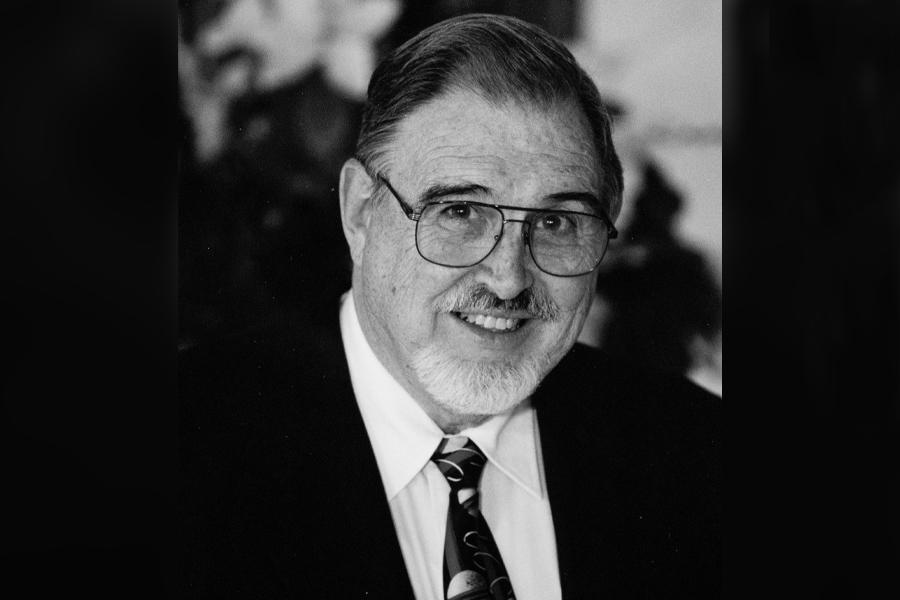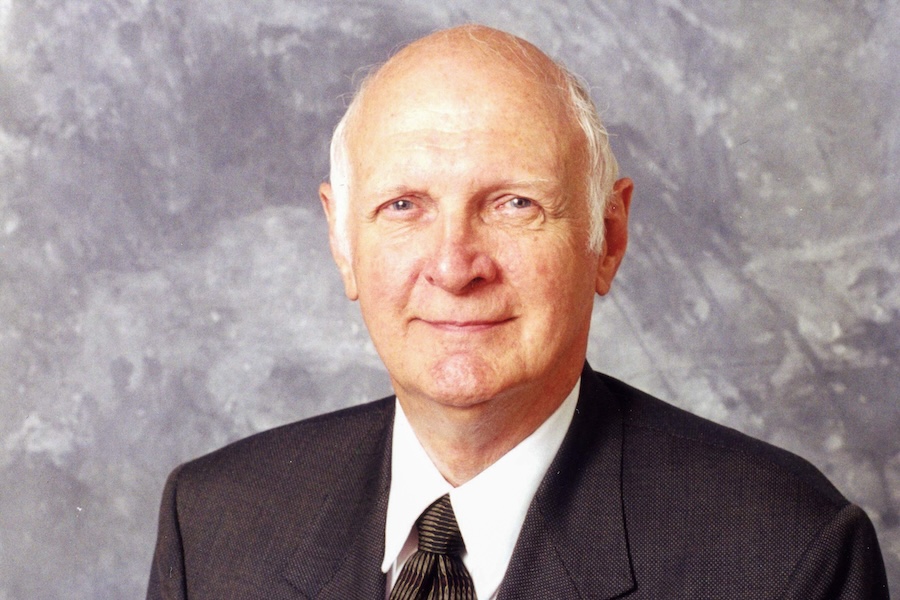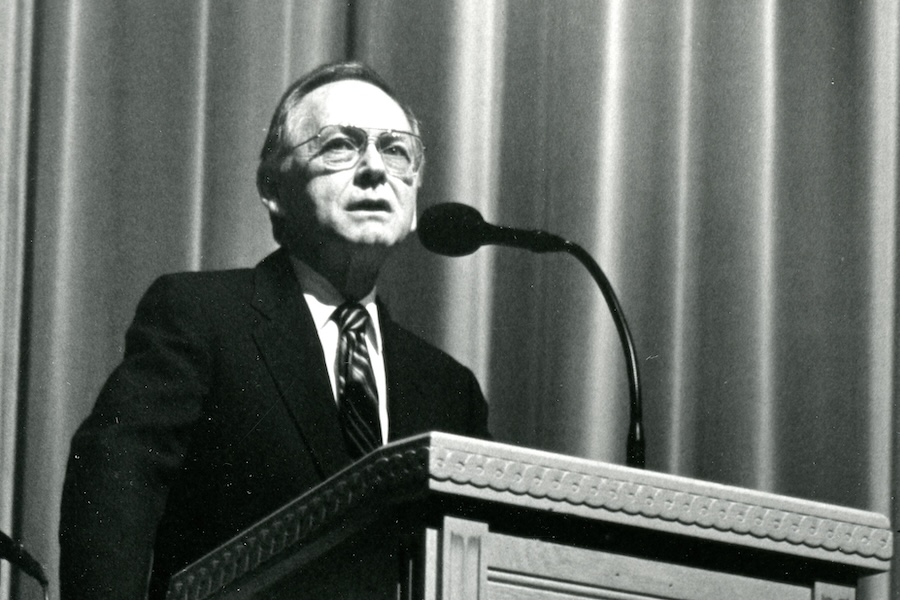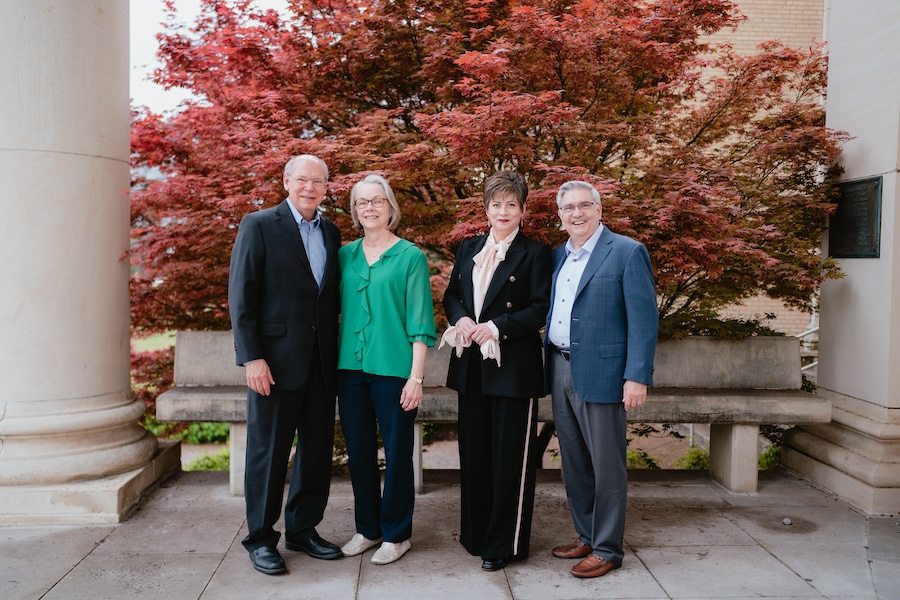Dockery encourages Southwestern community to maintain biblical worldview amid rising secularism
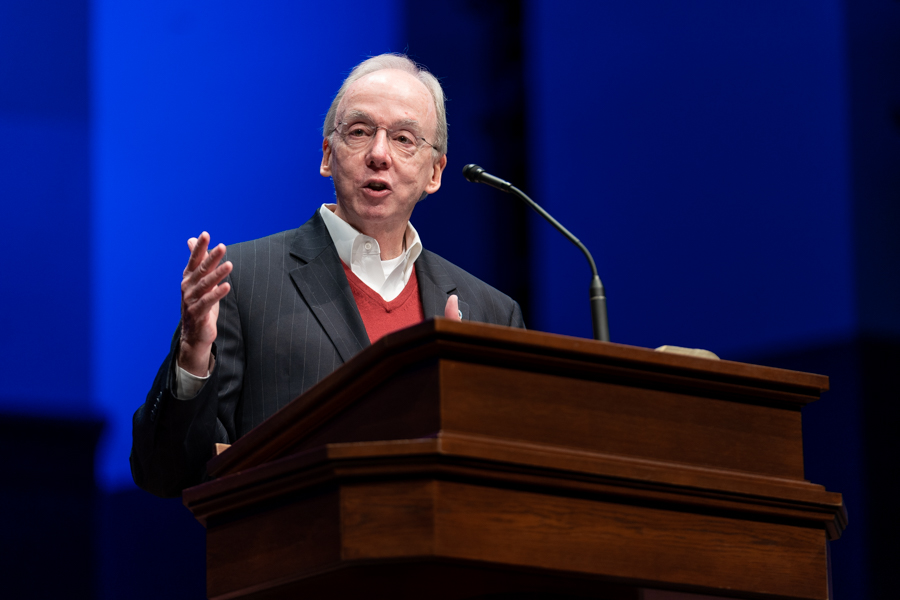
The seemingly pessimistic outlook about the futility of the human experience found in the Book of Ecclesiastes is actually a model of wisdom for Christian educators and students in addressing the secular age, David S. Dockery said in a Jan. 27 address to the Southwestern Baptist Theological Seminary and Texas Baptist College community.
In his introduction of Dockery, Adam W. Greenway, president of Southwestern Seminary and TBC, praised Dockery for his service as interim provost and vice president for academic administration, describing him as an “academic-pastor” to the faculty and academic team, as well as “a Southwesterner without peer.”
Rather than “skepticism, agnosticism, fatalism, and pessimism,” Ecclesiastes provides “guidance on how to think wisely about the issues swirling in our culture in this secular age,” Dockery contended in his address, “Worldview, Wisdom, Worship: Teaching and Learning in a Secular Age.”
Directing the attention of the assembly to three verses each from the first and concluding chapters of Ecclesiastes, which collectively assert that since everything is futile, believers must remember the Creator, fear God, and keep His commands, Dockery described the book of wisdom literature as “an invaluable resource for the teaching-learning process, as a genuine encouragement for the pursuit of wisdom, and as a valuable guide for our shared worship across the Southwestern campus.”
Explaining Ecclesiastes “served as a forerunner for us and for those before us on how to interpret and analyze syncretism and secularization,” Dockery then highlighted four points around the theme of the teacher who is introduced in Ecclesiastes 1:1, describing the book as a “master class.”
He added that the teacher mentioned in Ecclesiastes is “masterful,” not only for what he taught, but the manner he taught it, explaining the teacher helps believers understand how most people live from an “under the sun perspective,” a “this-earth-only perspective,” which is a prevalent attitude in America’s growing secularized society.
Dockery also highlighted the phrase “futility” as used by the teacher in verse 2. He stated, “the teacher has chosen to show the utter and absolute futility of a godless understanding of the world.” He explained that Ecclesiastes can be considered a tract for current times because the modern world is “also trapped in what philosophers and social scientists have described as a secular age, a world lacking a divine metanarrative.” He added, “many conclude that everything seems pointless, transitory, vaporous. It’s a time for tearing down.”
Dockery noted this despairing perspective does not apply to the Christian because by the end of Ecclesiastes futility is not the final word about life. He observed believers have the option of pursuing position, prominence, or wealth, or they can listen to the teacher, always considering how to engage the secular culture.
Dockery said at the end of Ecclesiastes 1, the teacher shows how godless philosophy, the pursuit of pleasure, materialism, moralism, religious sentimentality, thoughtless and shallow piety, and zealous activity leave people still yearning for something more.
Dockery then directed the assembly’s attention to chapter 12, which he stated was the teacher’s conclusion to the matter. He noted the teacher calls upon his students to remember their Creator, calling young and old alike to make connections to knowledge and learning.
“The teacher reminds us how easily we become deluded, diverted, deceived by sentimentality on the one side and secularization on the other,” Dockery said.
Although many Americans have fallen away from the Christian worldview, Dockery added, believers must fear the Lord, immerse their lives in God’s ways, think theologically about God, and be prepared to hear and act upon the final charge of this book, which is to worship God and to live with wisdom.
Dockery also highlighted the teacher’s manner of teaching in Ecclesiastes 12:9-11, noting that while strong research and pedagogical skills, clear argumentation, and thoughtful word selection are important traits, more importantly, the teacher in Ecclesiastes pushed his students toward truth and God’s Kingdom.
He recognized Ecclesiastes is not so much treatment of systematic theology, but rather a work of apologetics that teaches believers to avoid living secular lives.
Dockery pointed out that Ecclesiastes closes with a final message from the teacher: “not that nothing matters, but that everything matters because everything matters to God” and that “everything that we do across this campus, it all matters.” He added that “we should fear, worship, and rightly order our lives and adoration around God, otherwise our lives remain confused.”
Finally, Dockery encouraged Southwestern educators and students to be characterized in this secular age by their teaching and learning excellence, intellectual seriousness, evangelical faithfulness, academic rigor, reflective engagement, as well as authentic worship and wise kingdom commitment.
“Southwestern educators and Southwestern students, at this time in the midst of this ever-expanding secular age, are more and more to be characterized by teaching excellence, learning excellence, intellectual seriousness, by evangelical faithfulness, by academic rigor, reflective, engagement, as well as authentic worship and wise Christian commitments for the living of these days,” Dockery concluded. “These things must be more than lip service for us on this campus.”
Dockery, who serves as interim provost and vice president for academic administration and is distinguished professor of theology at Southwestern Seminary, was awarded a Master of Divinity from the school in 1981 and was named a 2002 distinguished alumnus of the institution.
Having authored or edited more than 40 volumes, and contributed to more than 75 other books, Dockery is best known for his works in the areas of Baptist studies, Christian higher education, and biblical interpretation. He is also the editor of the Southwestern Journal of Theology, the oldest theological journal continuously published by a Southern Baptist seminary.
Dockery’s entire message can be viewed here.
Chapel is held every Tuesday and Thursday morning at 10 a.m. (CT) in MacGorman Chapel on the campus of Southwestern Baptist Theological Seminary. Chapel may be viewed live at swbts.edu/live.
